The Year in Review: Celebrating Our Achievements in 2014 Part 2
Part 2 of our “year in review” focuses on the hospitals, research institutes and centers that are part of the UF Health family. When added to the colleges described last week, the size and scope of UF Health is nothing short of astonishing. We can all be very proud of the level of achievement at our academic health center, and look forward to a bright future with much anticipation.
- UF Health Cancer Center
- Clinical and Translational Science Institute
- Institute for Child Health Policy
- The UF Diabetes Institute
- Emerging Pathogens Institute
- UF Genetics Institute
- Institute on Aging
- Evelyn F. & William L. McKnight Brain Institute
- UF Health Shands Hospital (Shands Teaching Hospital and Clinics Inc.)
- UF Health Jacksonville
UF Health Cancer Center
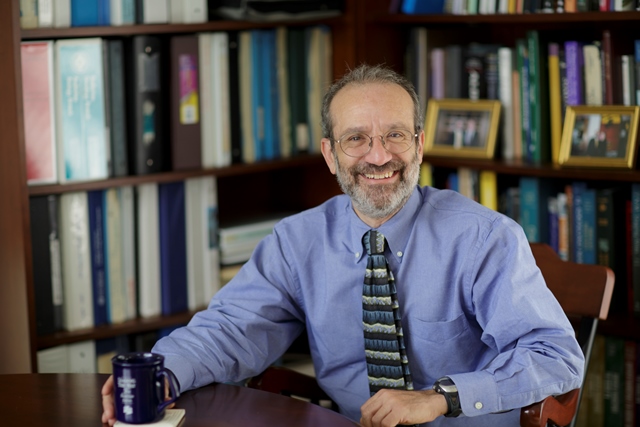 Director: Paul G. Okunieff, M.D.
Director: Paul G. Okunieff, M.D.
The UF Health Cancer Center is enjoying another year of scientific, humanitarian and clinical progress. Recognized by the state for excellence in oncological care and research, we were among three institutions identified to receive funds toward advancement and maintenance of National Cancer Institute designation. This recognition is a direct result of our continuing increase in peer-reviewed funding and our growing clinical research portfolio. Our peer-reviewed cancer funding is now over $22 million in direct costs with over $10 million from the NCI. Among this year’s awards is a prestigious P20 grant, led by Folakemi Odedina, Ph.D., with Yehia Daaka, Ph.D., and in collaboration with FAMU, which aims to train minority scientists in disparities cancer research.
In collaboration with Thomas Pearson, M.D., M.H.P., Ph.D., executive vice president for research and education, we have established truly college- and department-matrixed committees for Cancer Therapeutics, Cancer Biology and Human Services Research. These extremely active and interactive committees are tasked with achieving NCI designation through recruitments, infrastructure improvements and clinical trials development. The committees are off to a powerful start having already run competitive grants for pilot projects, bridge grants and collaborations with our Orlando and Jacksonville campuses; rehabilitating 10,000 square feet of lab space; and having already identified and signed many preeminent recruitments.
Regarding clinical research advances, Duane Mitchell, M.D., Ph.D., co-director of the Preston A. Wells Jr. Center for Brain Tumor Therapy and director of the UF Brain Tumor Immunotherapy Program, has received an IND, and has treated the first four children using his innovative vaccine for medulloblastoma. Entrinsic Health Solutions, a company based on the science of the Vidyasagar lab, has completed a successful clinical trial and is embarking on further studies to reduce radiation- and chemotherapy-induced enteropathy. The team of “protoneers” led by Nancy Mendenhall, M.D., published amazing outcomes for men with intermediate risk prostate cancer, 99 percent five-year clinical and chemical disease-free survival. Likewise, our bone marrow transplant team, led by John Wingard, M.D., showed its preeminence with a one-year risk-adjusted survival rate in the top 2.5 percent for all transplant centers nationally as ranked by the Stem Cell Therapeutic Outcomes Database. This is one of the best in the USA and the best in Florida.
To assure growth in quality, the Cancer Center is very pleased to have recruited C. Parker Gibbs, M.D., as the newly established deputy director for medical services, with the challenge of assuring superb quality, caring and satisfaction for our cancer patients throughout UF Health.
Next year holds both promise and challenge, with plans to further increase our research portfolio, recruit basic researchers, provide new products to reduce the burden of cancer and expand our reach to the underserved and elderly in our catchment area.
Clinical and Translational Science Institute
Director: Dave Nelson, M.D.
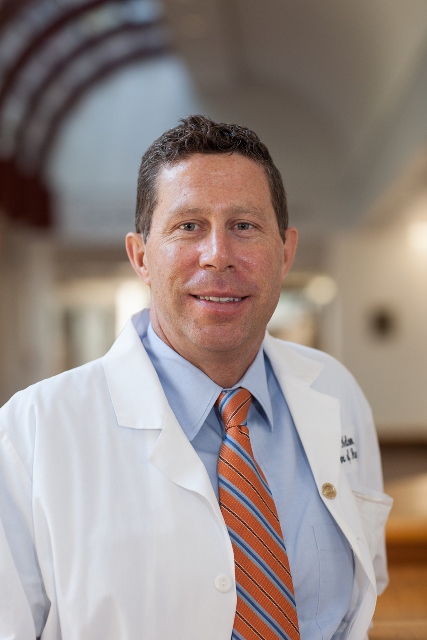 The CTSI continued to serve as a catalytic hub for translational research by leading transformative programs, providing services and resources for research teams, offering a diverse portfolio of training programs and community engagement opportunities, and collaboratively developing a vision for the next five years. The CTSI served more than 1,000 investigators in 2014. The CTSI also welcomed two new program directors who joined the university through the UF Preeminence initiative: William R. Hogan, M.S., M.D., a professor of health outcomes and policy in the College of Medicine and director of the CTSI Biomedical Informatics Program, and Janice L. Krieger, Ph.D., an associate professor of advertising in the College of Journalism and Communications and director of the CTSI Communications Research Program.
The CTSI continued to serve as a catalytic hub for translational research by leading transformative programs, providing services and resources for research teams, offering a diverse portfolio of training programs and community engagement opportunities, and collaboratively developing a vision for the next five years. The CTSI served more than 1,000 investigators in 2014. The CTSI also welcomed two new program directors who joined the university through the UF Preeminence initiative: William R. Hogan, M.S., M.D., a professor of health outcomes and policy in the College of Medicine and director of the CTSI Biomedical Informatics Program, and Janice L. Krieger, Ph.D., an associate professor of advertising in the College of Journalism and Communications and director of the CTSI Communications Research Program.
CTSI accomplishments reflect the dedication of hundreds of faculty, staff and students from across the university and of partners throughout the state.
Transformation
CTSI efforts to transform the research environment gained significant momentum in 2014.
OneFlorida: In June, the Florida Department of Health’s James and Esther King Biomedical Research Program awarded a $1.6 million grant to UF to help establish the OneFlorida Clinical Research Consortium. The grant is supporting development of the statewide OneFlorida network and its related infrastructure; a pragmatic clinical trial examining practice interventions to enhance provider screening, counseling and referrals for tobacco cessation; and a new minority education program in collaboration with Edward Waters College and Florida A&M University. Led by the UF CTSI in collaboration with Florida State University and the University of Miami, the OneFlorida network has been the site for two completed implementation science studies and three ongoing pragmatic clinical trials involving more than 120 different physician practices and 15,000 patients.
Personalized Medicine: Developed within the UF CTSI, the UF Health Personalized Medicine Program continued its work on multiple fronts to develop, implement, study and refine methods that allow genetic information to be used as a routine part of patient care. The program published the results and lessons learned from its successful first year of implementing genetic testing to guide antiplatelet therapy for interventional cardiology patients at UF Health, implemented clinical genetic testing services for additional medications and launched new education programs. As part of its dissemination strategy, the program also created a new website with resources for patients, clinicians and researchers, including SNP•its, an online publication for health care professionals interested in the clinical implications of pharmacogenomics research.
Pilot Programs: CTSI pilot support for interdisciplinary and investigator-initiated translational research was augmented by two new opportunities launched by CTSI programs in 2014. In collaboration with the Office of the Executive Vice President for Research and Education at UF Health, the CTSI Implementation Science Program awarded four Pipeline to Proposal Development grants to create new opportunities for patients to help shape research priorities related to autism, chronic obstructive pulmonary disease, dental emergencies and obesity. The Southeast Center for Integrated Metabolomics awarded its first round of competitive Pilot & Feasibility Project Awards, which enhance metabolomics research by providing support for investigators new to the field, the development of new teams and partnerships, and high-risk/ high-impact research. The 2014 awards supported 11 projects led by investigators at UF as well as Cornell University, the University of Illinois, the University of Miami, the University of North Florida and Yeshiva University.
Research Services & Resources
The CTSI developed its new Service Center to help research teams efficiently access the CTSI’s 45 research services, navigate the UF research landscape and connect with potential collaborators. New services supported in 2014 include the Center for Cellular Reprogramming, which is using CTSI support to initiate services, resources and training for induced Pluripotent Stem Cell derivation and related reprogramming technologies, and the Center for Safety, Simulation & Advanced Learning Technologies, which is using CTSI support to help to align, advance and expand access to novel simulation resources available at UF.
Education & Engagement
Education: The CTSI enhanced and expanded its career and professional development programs, including reconfiguring its long-standing Advanced Postgraduate Program in Clinical Investigation to create the Training and Research Academy for Clinical and Translational Science (TRACTS). A unique two-year, tuition-funded mentored training program for UF clinicians, TRACTS is designed to provide junior faculty and senior fellows with sufficient research experience, didactic knowledge and publishable research outcomes to be competitive for NIH K-level mentored research awards. The CTSI welcomed new KL2, TL1 and TRACTS scholars as well as the CTSI Mentor Academy’s first cohort of Master Mentors.
Engagement: The CTSI developed new opportunities for community engagement, including Our Community, Our Health. Launched by HealthStreet and the CTSI in 2014, Our Community, Our Health is a quarterly public forum that brings together researchers and the community to foster an open dialogue to help patients and consumers understand health research findings, and to identify community-driven research priorities. In the spring, the CTSI also teamed up with UF Health Communications and the UF Center for Precollegiate Education and Training to engage the campus community and Florida science teachers in the National Institutes of Health Common Fund 10-Year Commemoration video contest, resulting in UF’s creative science videos claiming three of the top six spots nationwide.
Vision for the Future
During the last four months of 2014, the CTSI collaborated with more than 90 faculty and staff as well as its Community Advisory Board to develop a grant application for its next five years of funding through the National Institutes of Health’s Clinical and Translational Science Award program. The application lays out a vision for building on UF’s unique strengths to chart new pathways for translational workforce development, embed translational science throughout our learning health system, expand statewide collaborations and accelerate the collective impact of the national CTSA network.
Institute for Child Health Policy
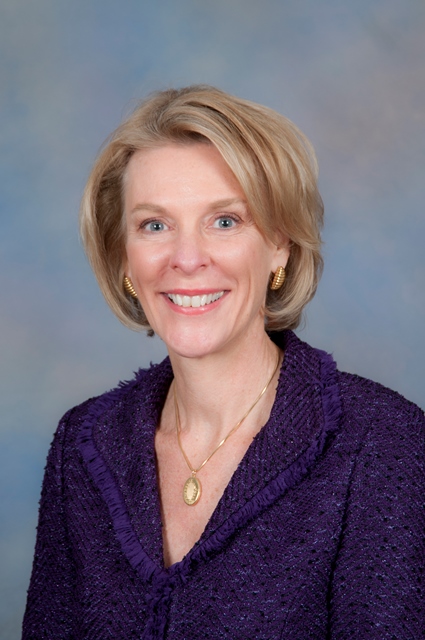 Director: Betsy A. Shenkman, Ph.D.
Director: Betsy A. Shenkman, Ph.D.
The Institute for Child Health Policy is dedicated to improving the health of children through rigorous science. The institute leverages large data sets and employs a variety of scientific methods to develop and test novel approaches to improving health care, promoting health and wellness, analyzing policy effects, advancing health research, impacting communities and helping the most vulnerable populations.
ICHP has enjoyed a strong year in research and collaboration. The institute’s faculty members have expanded their diverse funding portfolio with a total of $21.2 million in grant funding in fiscal year 2013-14 as well as $48.2 million in newly garnered awards. ICHP faculty also continued to increase their research productivity with 94 publications in the past fiscal year. In an effort to spur interdisciplinary research across the University of Florida’s College of Medicine, Lindsay A. Thompson, M.D., M.S., an associate professor of pediatrics, was selected as the first assistant director of clinical research for ICHP in 2014. In addition, the institute is actively recruiting candidates for several open faculty positions.
Lindsay A. Thompson, M.D., M.S., an associate professor in the Department of Pediatrics and ICHP’s assistant director of clinical research, will play an integral role in strengthening the institute’s clinical focus and building upon its existing strengths in policy and community-based research.
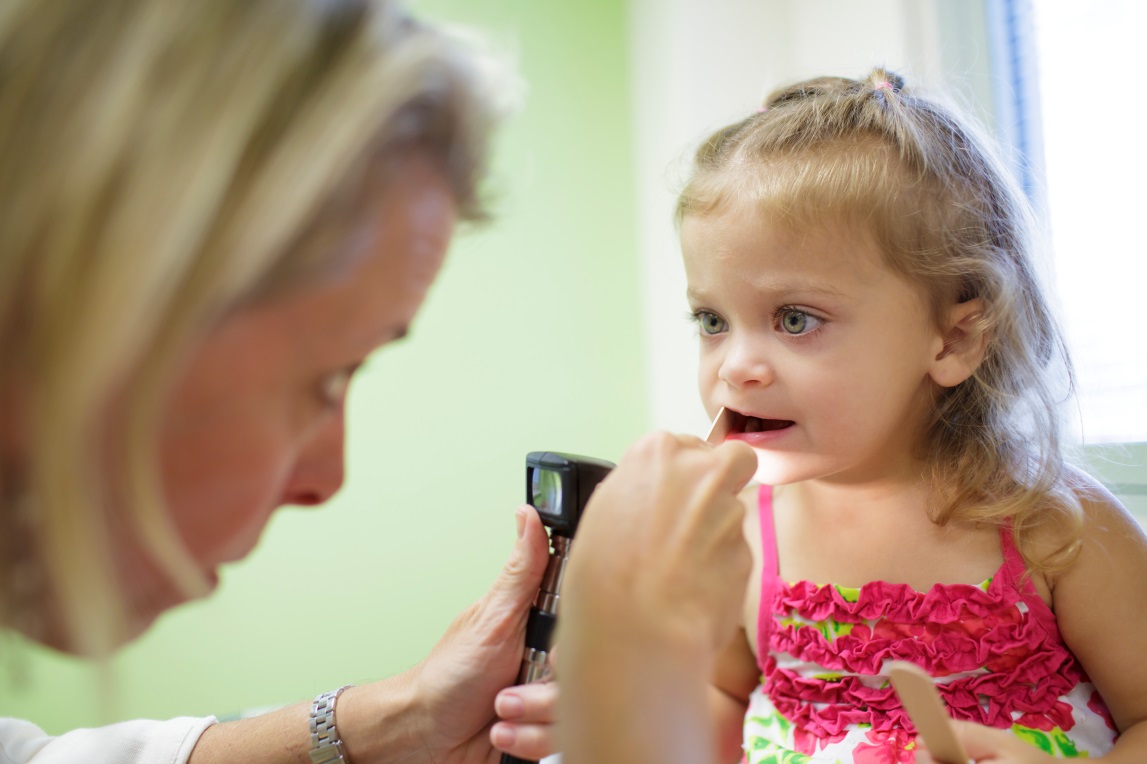 Statewide & National Research Portfolio: Building on its expertise in data analytics, ICHP also serves as key infrastructure support in the UF CTSI-led OneFlorida Clinical Research Consortium, which received $1.6 million in funding from the Florida Department of Health’s James and Esther King Biomedical Research Program in 2014 to create an enduring research infrastructure to improve health and health policy across the state. The statewide consortium includes all of Florida’s 67 counties and covers 13 million Floridians. In particular, institute faculty will play key roles in a tobacco cessation implementation science study conducted through the OneFlorida Cancer Control Alliance. The OneFlorida Clinical Research Consortium is also the site for a multipronged effort to increase HPV vaccination rates among boys and girls in Florida using innovative health information technology and the development of an oral health alliance.
Statewide & National Research Portfolio: Building on its expertise in data analytics, ICHP also serves as key infrastructure support in the UF CTSI-led OneFlorida Clinical Research Consortium, which received $1.6 million in funding from the Florida Department of Health’s James and Esther King Biomedical Research Program in 2014 to create an enduring research infrastructure to improve health and health policy across the state. The statewide consortium includes all of Florida’s 67 counties and covers 13 million Floridians. In particular, institute faculty will play key roles in a tobacco cessation implementation science study conducted through the OneFlorida Cancer Control Alliance. The OneFlorida Clinical Research Consortium is also the site for a multipronged effort to increase HPV vaccination rates among boys and girls in Florida using innovative health information technology and the development of an oral health alliance.
The oral health alliance will build upon ICHP’s expansive portfolio in pediatric oral health outcomes research. Several faculty members are working in conjunction with the Dental Quality Alliance to establish nationally recognized measures of oral health quality care. In addition, ICHP faculty members, in collaboration with the Florida Medical School Quality Network, received a grant to improve primary care providers’ use of evidence-based practices for oral health screening, in an effort to reduce and treat dental caries among Florida’s children enrolled in Medicaid. Dental caries are the most common infectious disease in children and, if left untreated, they can result in lifelong chronic health problems. The Florida Medical School Quality Network is an alliance of Florida’s nine medical schools and is focused on conducting innovative analyses addressing quality and outcomes of care among the more than 3.5 million Medicaid recipients in the state.
ICHP also is collaborating with the National Dental Practice-Based Research Network, funded by the National Institute for Dental and Craniofacial Research, to conduct a feasibility study focused on conducting comprehensive health risk assessments in dental practices. Some children do not have contact with primary care providers, so being able to obtain dental care and screening for health risks wherever they are seen is essential.
The Institute for Child Health Policy holds several competitive awards to evaluate Florida’s Medicaid programs, which gives ICHP faculty the unique opportunity to work with the states and their data to evaluate the quality and outcomes of care for children who are the most vulnerable due to their income, poor health status and racial/ethnic minority status.
At the NIH and AcademyHealth’s annual conference on the science of implementation and dissemination, associate director of ICHP Kelli A. Komro, Ph.D., M.P.H., presented the preliminary results of her five-year, $4.7 million NIH-funded study, which is showing promise in reducing underage alcohol use in rural Oklahoma in partnership with the Cherokee Nation. In addition, the research team received two related NIH grants in 2014: one to support a postdoctoral fellow from the Cherokee Nation and a supplemental grant to explore patterns, risk factors and consequences of alcohol use among female Native American teenagers.
Notable Faculty Accomplishments: In 2014, two ICHP faculty members, Komro and Alexander C. Wagenaar, Ph.D., continued their collaboration with the Public Health Law Research Program at Temple University, examining the impact of policies and laws, such as earned income tax credits, minimum wage laws and unemployment compensation, to address the social determinants of health outcomes, and their first publication from this research was in the SSRN’s Top Ten download list. In addition, Komro co-authored a prestigious Cochrane Systematic Review with researchers in England and Australia to evaluate the efficacy of school-based interventions to improve health.
In addition, Betsy Shenkman, Ph.D., director of ICHP and chair of the Department of Health Outcomes and Policy, was selected for the 2013-14 class of the Hedwig van Ameringen Executive Leadership in Academic Medicine Program, which is a highly selective yearlong leadership development program that has the goal of increasing the number of women in the highest levels of leadership in academic medicine.
Finally, Mildred Maldonado-Molina, Ph.D., an ICHP faculty member who spearheaded the recent launch of an online graduate certificate in health outcomes and policy for the Department of Health Outcomes and Policy, was named to the board of trustees of the Society for Prevention Research.
Collaborations Across UF: ICHP brought together more than 100 UF faculty, staff and students at its annual research event to discuss children’s health research, and its poster session represented work from 28 different UF departments, programs and centers as well as 18 organizations from across the United State and world. The evening’s keynote speaker was Bill Hogan, M.D., M.S., an ICHP faculty member who was hired in 2014 as part of the UF Rising initiative to help leverage the power of Big Data in solving health care problems and improving health. Hogan is currently recruiting for two faculty positions and recently launched an on-campus graduate certificate in biomedical informatics, which will enroll its first class in Fall 2015.
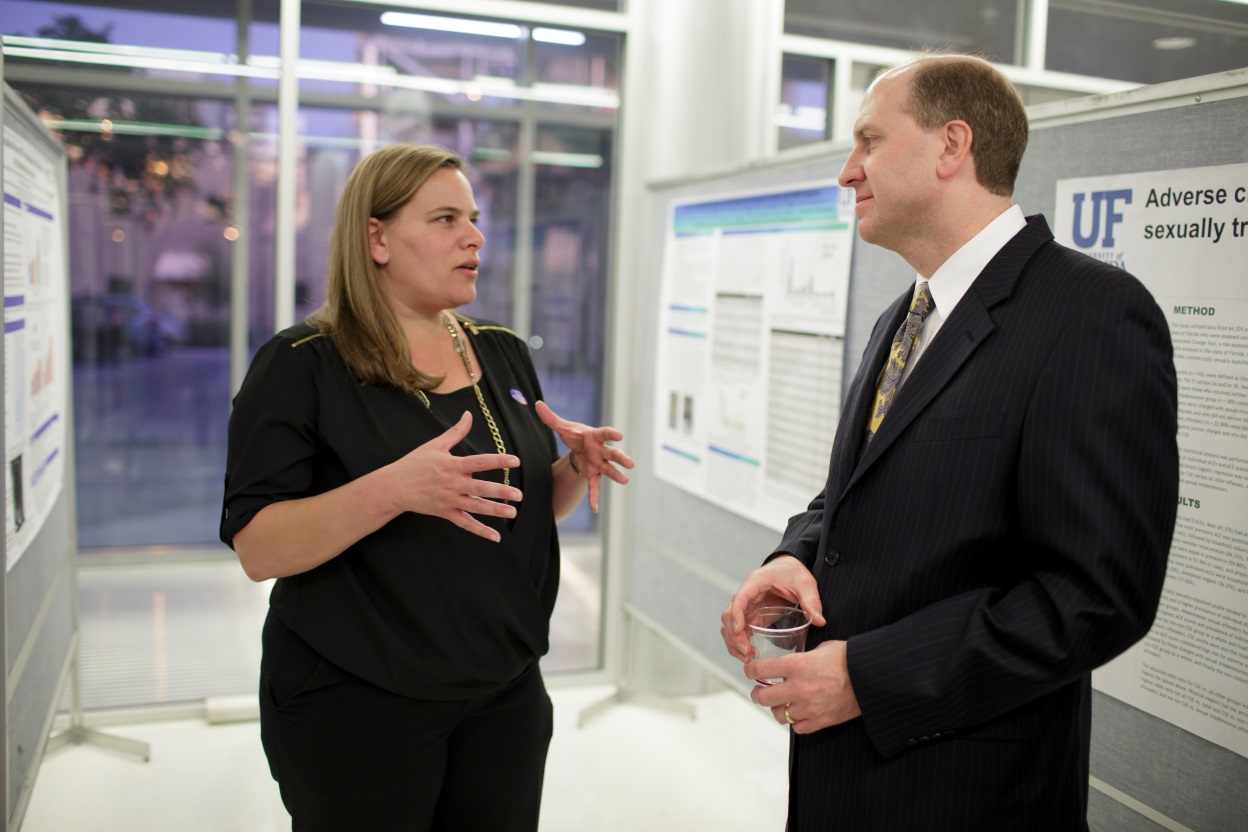
Finally, the Institute for Child Health Policy, in collaboration with the Department of Pediatrics, funded three pediatric work groups at UF in 2014 to leverage data held in the Vulnerable Populations Integrated Data Repository (housed in the Department of Health Outcomes and Policy) to enrich the institute’s existing research portfolio and address emerging issues in children’s health.
The UF Diabetes Institute
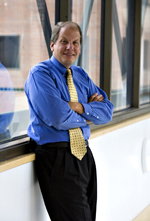 Director: Mark Atkinson, Ph.D.
Director: Mark Atkinson, Ph.D.
2014 will likely be viewed as a key time…an “inflection point” in the timeline for the diabetes program at The University of Florida. In November, the university designated “diabetes” as an official institute, not only for its programs at the health science center, but also for efforts throughout our campus and across the state. This designation was achieved with guidance and support from many across our campus, including its leadership. At the Health Science Center this included guidance and support from the dean of UF’s College of Medicine (Michael Good, M.D.), the executive vice president for research and education (Thomas Pearson, M.D., MPH, Ph.D.), and the senior vice president for health affairs (David Guzick, M.D., Ph.D.).
As a result of operating under these values, our diabetes programs continually experienced a number of positive outcomes.
Those noteworthy in 2014 include:
- A Diabetes Institute-affiliated department, Pediatric Endocrinology, was the highest-ranked clinical program at UF Health and in the state of Florida, and in the Top 15 nationally (U.S. News & World Report, 2014).
- Diabetes Institute faculty generated more than $20 million in research funding from a variety of federal and state agencies, foundations and industrial concerns.
- Our program remained the world’s top recipient of research funding from JDRF, the world’s largest non-governmental agency providing funds dedicated to type 1 diabetes.
- The medical director for the Diabetes Institute, Dr. Desmond Schatz, was named president-elect of the American Diabetes Association. The ADA is the country’s largest nongovernmental effort dedicated to improving the lives of those with diabetes in all forms, operating through improved education, advocacy and research.
- As part of the university’s preeminence campaign, the College of Engineering, in cooperation with the College of Medicine, recruited a nationally recognized biomedical engineer (Cherie Stabler, Ph.D.), a former NIH Pathfinder Award Winner.
- A series of clinical initiatives seeking to improve care were initiated, under the direction of Dr. Kenneth Cusi, adult medical director of the Diabetes Institute.
- UF Health diabetes educators received over 2,000 inpatient diabetes education consultations.
- In June 2014, Enterscape noted Dr. Atkinson as the No. 2 ranked individual, at a global level, for influence in the field of diabetes (of more than 60,000 professionals). Dr. Schatz, medical director – pediatrics of the institute, was No. 7. UF was the only institution with two top 10 members in this study.
- Diabetes Institute members Dr. Linda Bobroff and Dr. Michael Perri received major support for advancing efforts in prevention and wellness for at-risk diabetes populations in counties throughout Florida.
Why have an institute dedicated to diabetes?
- 29.1 million Americans have some form of diabetes
- 86 million Americans are prediabetic
- 7th leading cause of mortality in the United States
- $245 billion for diagnosed diabetes care
- People with diabetes have medical expenses 2.3 times higher than people without the disease
- The CDC reports 1 out of every 10 clinic visits nationally are now diabetes-related
- 1.74 million adults (10% of the Florida population) have diagnosed diabetes; an additional 843,000 remain undiagnosed
- 1 out of every 4 patients admitted to a UF Health hospital last year had diabetes as part of their diagnoses
- North Central Florida has the highest prevalence of diagnosed diabetes in the entire state
- Diabetic expenses in Florida totaled $18.9 billion in 2013
With approximately 100+ faculty members from the colleges of Engineering, Medicine, Nursing, Pharmacy, Public Health and Health Professions and Veterinary Medicine as well as the Institute of Food and Agricultural Sciences, the Institute on Aging and the UF Genetics Institute, and more, the new Diabetes Institute is believed to be unique among other diabetes centers/institutes at a national level. Such a belief derived from the notion that its membership leverages a remarkable degree of intellectual breadth and depth in all facets of the disease — uniting innovative patient care, empowering self-management education and providing for new opportunities in research, prevention and treatment of the various manifestations of this disease.
For additional events and milestones that occurred with respect to institute faculty or to learn more about this new program, please visit http://diabetes.ufl.edu/research/newsbriefs/.
Emerging Pathogens Institute
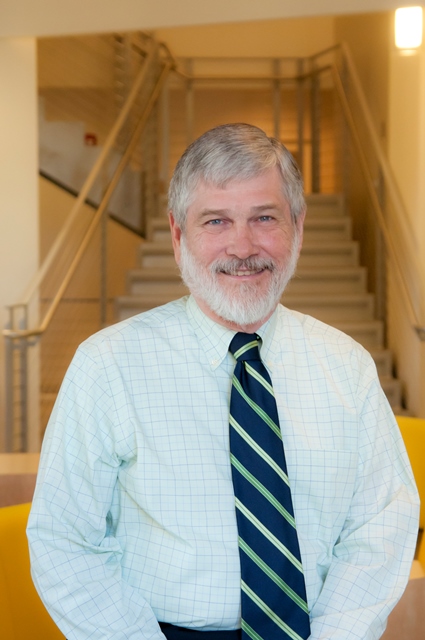 Director: J. Glenn Morris, M.D.
Director: J. Glenn Morris, M.D.
During 2014, EPI has continued to build its research portfolio in emerging pathogens/infectious diseases, further enhancing UF’s reputation as a top national and international center for infectious diseases research. In this year of Ebola, there has also been a strengthened emphasis on global health, reflecting the importance to Florida (and the United States) of understanding why pathogens emerge, and are transmitted, at a global level.
- Ebola has taken center stage this year, with the occurrence of epidemic disease in West Africa and associated concerns about entry of persons infected with the virus into the United States. While EPI does not have facilities to conduct laboratory studies with this Biosafety Level 4 (BSL4) pathogen, EPI faculty members have played a key role internationally in the development of mathematical models defining and predicting the course of the outbreak, including ongoing consultation with the World Health Organization (Dr. Ira Longini [PHHP/COM]) and publication of two modeling papers in The Lancet (Dr. Juliet Pulliam [CLAS]; Dr. Longini and colleagues). EPI faculty members have also been active in efforts to educate the public about real (and imagined) risks of Ebola, including a presentation to the Florida Congressional Delegation and the University System of Florida Board of Governors; the presentation can be viewed at: http://epi.ufl.edu/wp-content/uploads/2014/10/EPI-ebola-presentation-29-Sept-2014.pdf.
- EPI, from its inception, has focused on the importance of mathematical modeling in understanding emergence and transmission of infectious diseases. The institute’s strength in this area was underscored by its inclusion as part of the team awarded one of three Center Grants in the NIH-sponsored Models of Infectious Disease Agents Study, or MIDAS, in partnership with investigators at the University of Washington in Seattle and University of Michigan. Dr. Longini serves as PI of the UF component of the grant.
- EPI investigators continue to play a leadership role in the school-based influenza immunization program that provides free influenza vaccines to all children in Alachua County. Alachua County's vaccination rates are approaching 65 percent in elementary, 50 percent in middle and 30 percent in high schools, much higher than the national average. In data published this year by EPI investigators, the resultant limitation in spread in schools has resulted in reductions in influenza rates across all age groups in the community. Of particular note, the campaign has resulted in an 89 percent reduction in influenza among children in the 0-4 year age group, presumably because older brothers and sisters are not bringing the virus home from school.
- EPI, in collaboration with PHHP and other colleges, continues to build a strong research base in the Gressier region of Haiti. Current studies include work on cholera transmission and evolution (funded by NIH), chloroquine resistance in malaria (funded by DOD), sexually transmitted infections (DOD), vectorborne transmission and clinical characteristics of dengue and chikungunya, and multi-drug-resistant tuberculosis (CDC); these studies are linked with work on sanitation, water systems and nutrition. In the spring of 2014, EPI inaugurated a new biosafety level 3 (BSL3) laboratory at the Gressier site. The 1,500-square-foot facility will be used to the train researchers to better understand and fight tuberculosis in Haiti. Researchers who will be trained in this new BSL-3 lab will be part of the LNSP Training Program, an intense six-month training program that teaches Haitian researchers about rapid molecular TB diagnostics techniques and other diagnostic tests. The goal of the program is to build the capacity for better TB research and diagnostics resulting in the improvement of the health of the Haitian people. According to the U.S. Centers for Disease Control and Prevention, Haiti has the highest rate of TB in the hemisphere, and nearly 40 percent of the people with TB go undiagnosed.
- A number of new faculty members have joined EPI during 2014, including hires under the UF Preeminence initiative. Further enhancing the modeling capabilities at EPI, preeminence hires Drs. Jim Anderson and Arie Havelaar (IFAS) will play a lead role in the development of global models for food safety and security. Preeminence hire Dr. Greg Glass (CLAS) will further expand EPI activities in geographic/spatial modeling of pathogen transmission, with the assistance of Dr. Sadie Ryan (CLAS). Further laboratory-based studies with bacterial pathogens will be initiated by preeminence hire Dr. Herbert Schweizer (COM), with the assistance of Dr. Apichai Tunyok (Veterinary Medicine).
- Among other recent publications from EPI investigators are papers on phylodynamic analysis of clinical and environmental Vibrio cholerae isolates from Haiti (Drs. Salemi, Ali, Johnson and Morris, COM/PHHP, and colleagues); the effect of malnutrition on norovirus infection (Drs. Karst, Salemi and Mai, COM/PHHP, and colleagues); anthrax surveillance in wild boar in the Ukraine (Dr. Blackburn, CLAS, and colleagues); pox virus in sea otters (Drs. Wellehan and Waltzek, Vet Med, and colleagues); isolation of influenza virus from camels in Mongolia (Dr. Gray, PHHP, and colleagues); and preservation of viral genomes in 700-year-old caribou feces from a subarctic ice patch (Dr. Varsani, IFAS, and colleagues; published in PNAS).

UF Genetics Institute
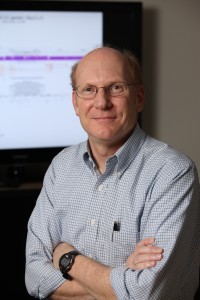 Director: Patrick Concannon, Ph.D.
Director: Patrick Concannon, Ph.D.
The UF Genetics Institute seeks to promote excellence in the areas of genetics and genomics at the University of Florida by 1) building community, facilitating collaboration and creating opportunities for intellectual exchanges among investigators working in diverse taxonomic systems but with a common set of approaches in genetics and genomics, 2) supporting recruitment and retention of outstanding faculty in the areas of genetic and genomics, 3) supporting graduate education in the areas of genetics and genomics, and 4) enhancing the ability of researchers at the University of Florida to compete for multidisciplinary research grants in the area of genetics and genomics.
Faculty members of the UFGI represent seven different colleges and 49 different academic departments. During 2014, the UFGI welcomed six new members, bringing the total faculty membership to 237.
Research: In 2014, UFGI members published more than 800 scholarly articles, including multiple articles in high profile journals such as The New England Journal of Medicine, Science, Nature, The Lancet and Nature Genetics. These reports included medical studies on the impact of pharmacogenomics on dosing for warfarin, and on the risk of breast cancer in women carrying mutations in the gene PALB2. Noteworthy basic science studies from UFGI faculty in 2014 included the first report of a genome sequence from ctenophores, or comb jellies, providing novel insights into pathways of neural development; a sequencing study of the pathogen responsible for potato blight, a disease that costs Florida growers millions of dollars every year; and a group of landmark studies focused on the relationships between the genomes of crocodilians, including the American alligator, and the evolution of birds, creating a bird “tree of life.”
Education: In 2006, the UFGI founded the Genetics and Genomics Graduate program, which trains students in genetics and genomics with a focus on computational approaches. In 2014, three students earned their Ph.D. degrees in the program, bringing the total number of graduates to 15. This intercollegiate program, directed by the UF Genetics Institute, continues to grow with four more students admitted in the current year and interviews underway for the class of 2015.
Outreach: The UF Genetics Institute continued to expand its weekly seminar series in 2014, with more than 20 invited external speakers. The invited speakers reflect the broad, multidisciplinary mandate of the UF Genetics Institute, and included outstanding investigators from the fields of Bioinformatics, Genomics, and Cell Biology working on a variety of different species and model systems.
In August, 2014, UFGI hosted the second annual Phenotype Prediction Workshop. The objective of this workshop was to present recent results and theoretical developments of statistical models used to predict the phenotype of complex traits using genomic data. Presentations included studies from humans, trees, crops and livestock. The workshop was streamed live to attendees in more than 50 countries.
The Florida Genetics Symposium, hosted annually by the UF Genetics Institute, featured a keynote address from Roger Beachy, founding executive director of the World Food Center at University of California, Davis. A member of the National Academy of Sciences, Beachy is internationally known for his groundbreaking scientific work on crop disease resistance, and for his visionary leadership in food and agriculture research. More than 300 attendees heard the keynote presentation from Dr. Beachy as well as talks from a host of distinguished speakers, both from UF and other institutions. More than 150 posters were presented with awards given for the best poster presentations by students and postdoctoral associates.

Institute on Aging
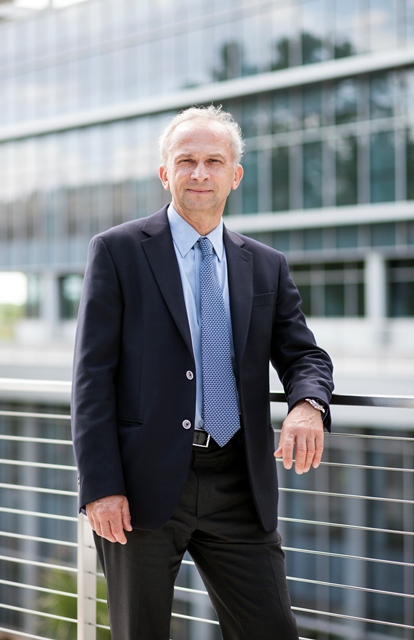 Director: Marco Pahor, M.D.
Director: Marco Pahor, M.D.
2014: A decade of evolution — The first decade of the University of Florida Institute on Aging was a decade of growth. Now, as the UF Institute on Aging is about to celebrate its 10th anniversary, we are in a stage of evolution by further expanding our faculty base and our collaborations across UF colleges, institutes, centers and departments. In recent years, the Institute on Aging’s faculty and staff researchers have built their independence, funding the majority of their research through extramural grants. We currently have more than 40 active grants, and are constantly looking to expand our research imprint. As our research grows, we are evolving into an educational institute. We have spent the past two years developing curriculum for two educational programs, an online graduate certificate and an online master’s degree in aging and geriatric practice. Both will be offered in 2015. The programs will help develop health care, research and executive careers through education. Because they will be available online, the programs will have the ability to reach health professionals no matter where they are in the world.
Along with research and education, we have expanded clinical health care in the UF Health Shands Hospital. Now, we have geriatricians embedded in the acute care surgery (Trauma) service, the Medicine service, and in the Emergency department who can begin to care for older adults as soon as they come through our doors, and other geriatricians who provide expertise at the UF Health Senior Care clinic and to older adults in local skilled nursing facilities.
We have worked hard to build a robust institute over the past decade, creating a strong foundation of research. Over the next decade, we will continue to expand our research, and through the development of our educational and health care programs, promote healthy and independent lives for older adults.
The LIFE Study. More than 10 years ago, we asked whether moderate exercise for older adults could help them maintain their mobility and walk better for longer. We knew this research needed to cast a wide net, so we set up eight different field centers across the country as part of a study called the Lifestyle Interventions and Independence for Elders, or LIFE, study. Over the course of the study, more than 1,600 men and women ages 70 to 89 were assessed. The purpose of our study was to provide definitive evidence that physical activity lifestyle intervention can improve the independence of older adults. The results were conclusive: compared with a control group who attended health education classes but did not exercise, a significantly greater percentage of older adults who exercised were able to walk for a quarter of a mile, the equivalent of a trip around a neighborhood block, at the completion of the study. The exercising group was able to prevent the loss of mobility 18 percent higher rate than its non-exercising counterpart. While the rate of hospitalization in the exercising adults was slightly higher, though not statistically significant, the study proves that moderate exercise is key to keeping older adults mobile and independent. We published our results in Journal of the American Medical Association. Since then, 90 papers and 41 ancillary research studies have been completed or are in progress. The LIFE study has since provided help in building the framework for a similar study taking place in 11 European countries. The Sarcopenia and Physical Frailty in Older People: Multi-component Treatment Strategies, or SPRINTT, Project aims to use physical exercise, proper nutrition and technological tools to help frail older adults fight the challenges of aging.
The data of the LIFE study are currently being analyzed and the repository of biological samples from the study participants offers multiple opportunities for testing effects of physical activity on biomarkers. Two NIH R01 grants investigating the biological effects of physical activity have already spun from the LIFE study. The grant R01HL121023 titled “MTDNA variant modifiers of cardiopulmonary responsiveness to physical activity” (PI, Dr. Todd Manini) explores the effect of common and rare mtDNA variants on responsiveness to exercise of walking speed, blood pressure and pulmonary capacity. The grant R01AG044474 titled “Ultra-high-field neuroimaging in elderly after a two-year exercise intervention” aims to quantify the relationship of physical activity with ultra-high-field brain markers; identifying the localization of the physical activity -related changes in ultra-high-field brain markers; and exploring the role of ultra-high-field markers in explaining brain response to physical activity. In summary, the LIFE study offers a very broad range of opportunities to assess the biological effects of physical activity in large and understudied populations of frail older adults.
The Testosterone Trials — As men age, their production of testosterone gradually decreases. At the same time, they lose muscle mass but gain fat mass. Their mobility and cognitive function decreases, and they experience decreased sexual function, energy and decreased bone mineral density. Men’s incidence of bone fracture rises and their tolerance to glucose becomes impaired. In an attempt to improve these symptoms, older men are sometimes given testosterone treatments. But in 2003, a panel of the Institute of Medicine of the National Academy of Sciences recommended a coordinated set of clinical trials to determine if testosterone treatment actually does benefit men. In 2014, researchers from many institutions, including UF Institute on Aging director Marco Pahor, M.D., designed a set of seven clinical trials to measure whether testosterone treatment improves mobility, sexual function, fatigue, cognitive function, hemoglobin, bone density and coronary artery plaque volume. In all, 780 participants have been recruited to take part in the seven different trials, including 71 from the state of Florida. The results of this study will be published in 2015.
Sepsis Center — In 2012, UF researchers identified a condition they call persistent inflammation, immunosuppression and catabolism syndrome, known as PICS. The condition afflicts thousands of people each year, most often older adults who are successfully treated for sepsis. To study sepsis and PICS, in 2014 UF Health was awarded a five-year grant from the National Institutes of Health to create a one-of-a-kind sepsis treatment center. The grant, NIH P50GM111152, will help establish the UF Sepsis and Critical Illness Research Center. The first of its kind in the nation, the center will study long-term outcomes in patients treated for sepsis in the trauma and intensive care units at UF Health Shands Hospital, with the goal of developing clinical solutions for sepsis, PICS and other illnesses that stem from sepsis. The center reflects a partnership between the grant’s principal investigator Frederick A. Moore, M.D., chief of acute care surgery at UF Health and Lyle (“Linc”) Moldawer, Ph.D., a professor and vice chair of research in the department of surgery, along with several other UF Health colleagues. Christiaan Leeuwenburgh, Ph.D., a professor and chief of the division of the biology of aging in the UF department of aging and geriatric research; Anna-Maria Joseph, Ph.D., an assistant scientist with the division of the biology of aging; and Stephen Anton, Ph.D., chief of the division of clinical research, will be involved in one of the center’s projects. They will explore the possible role of immature immune system cells called myeloid-derived suppressor cells in the onset of persistent inflammation, immunosuppression and catabolism syndrome, a syndrome that often affects mostly elderly adults who have been successfully treated for sepsis. Leeuwenburgh will also be addressing muscle wasting within patients recovering from sepsis and PICS.
2014 was an extremely busy and productive year for the Cognitive Aging and Memory-Clinical Translational Research Program (CAM-CTRP). The CAM-CTRP by joint cross-funding leverages research and research career development efforts across the Institute on Aging Pepper Center and the Clinical and Translational Science Institute. We hosted the second annual External Review Board Meeting, which offered valuable insight and recommendations. The board reported that they are “very impressed with the rapid development of the CAM-CTRP” and the number of initiatives that are currently ongoing. We continue to focus our efforts toward the recruitment of a physician-scientist and making further progress on the development of clinical translational research focusing on interventions for the elderly.
Our research includes studies on real-time fMRI designed as an intervention to enhance emotional function in the elderly (Ebner, Sitaram, Cohen), and on transcranial direct current stimulation (tDCS), with studies being conducted by Drs. Adam Woods and Ron Cohen and grant applications being prepared for the winter NIH submission. Dr. Cohen has also been fostering research projects aimed at bringing novel pharmaceutical compounds to a phase 1 clinical trial. Specifically, he has worked with Drs. Bizon, Ashizawa and others in a workgroup focusing on a GABA inhibitor that has the potential to enhance learning and executive functioning in the elderly. Dr. Cohen’s newly awarded RO1 grant on obesity and type 2 diabetes focuses on the effects of bariatric surgery on brain function and aging. The project has major implications for understanding the aging brain, particularly the influence of metabolic factors associated with obesity and diabetes on brain structure and function, and the effects that reductions in these factors following bariatric surgery and significant weight loss have on brain function. This clinical trial provides an excellent experimental model for testing whether caloric reduction improves brain health, with major implications for healthy cognitive aging.
Education: In 2015, we will grow another branch in our institute. The Institute on Aging and the department of aging and geriatric research will offer two online educational opportunities led by Dr. Laurence M. Solberg, chief of the division of career development and education. The graduate certificate in aging and geriatric practice, which launches in the spring semester of 2015, requires that students complete 15 credits of coursework offered by the department. It can be completed in as little as one year and gives its students an additional credential in the field. In the fall of 2015, a master of science in medical sciences with a concentration in aging and geriatric practice will be offered. Credits completed in the certificate program can be applied to the master’s degree program. The graduate certificate program includes required courses in the theories of aging, geriatric and age-related diseases, foundations in aging and geriatric research and the law and ethics of aging. Additional courses that are required in the 36-credit master’s degree program include fundamentals of biological aging, clinical neuroscience of aging, population-based research on aging, lifestyle interventions in aging I and lifestyle interventions in aging II. The division also developed and implemented two intensive education programs called “geriatric care boot camp,” which trained almost 100 UF and UF Health Shands professionals on the care of the older patient. These education sessions included an overview of the geriatric patient, a session on delirium and dementia care, a session on palliative care, a session on medication management in the older patient, and an ethics case discussion about concerns in the elderly.
Patient Care: The Institute on Aging, working with Dr. Laurence M. Solberg, chief of the division of geriatric medicine, has helped expand UF Health Shands Hospital’s geriatric care with new consult services in the Trauma unit, Emergency Room and Medicine services. The addition of the geriatrics consult services has impacted the care of our older population by drastically reducing the mortality of patients consulted on in the hospital. To support this effort we welcomed two new providers whose expertise is in geriatric care. Jacobo Hincapie Echeverri, M.D., most recently a fellow in geriatric medicine at Harvard Medical School, is the embedded geriatrician in the emergency department. His position brings geriatric care to frail older patients as soon as they enter the hospital. Jianhong (Crystal) Hua, M.D., provides primary care to outpatient patients within the UF Health Senior Care Clinic as well as being the embedded geriatrician for inpatient medical services, working closely with the hospital’s medicine and teaching services. Hua recently completed a geriatric medicine fellowship here at UF with the department of aging and geriatric research within the Institute on Aging. Her background includes experience as a pediatric surgeon and as a family practitioner.
UF Health Senior care has expanded the primary care clinic in our new facility on the first floor of the Institute on Aging in the CTRB and also expanded clinical care with new urgent care visits during the day. In 2014 we increased our commitment to the Health Pavilion at Oak Hammock, with additional provider availability in the Senior Care clinic at Oak Hammock.
Evelyn F. & William L. McKnight Brain Institute
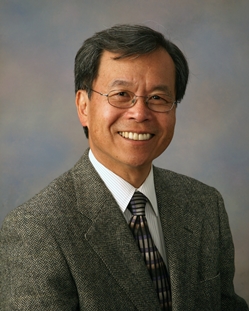 Executive Director: Tetsuo Ashizawa, M.D.
Executive Director: Tetsuo Ashizawa, M.D.
The Evelyn F. and William L. McKnight Brain Institute registers over 300 faculty members from 51 academic departments of 10 colleges at the University of Florida. The MBI engages in a wide variety of multidisciplinary research, focusing on understanding the structure and function of the brain during development and aging. The research at MBI also includes translation of new knowledge toward development of diagnostics and therapeutics for brain diseases and provides inspirations for novel brain-mimetic industrial technologies.
Progress in the MBI strategic plan:
The MBI’s strategic plan has completed its third year. Investigators in the MBI utilize a wide variety of cutting-edge technologies, such as gene therapy and molecular pharmacology, plasticity-based neuro-rehabilitation, stem cell and cell reprogramming, and biomedical engineering to address important questions of the brain in health and disease. 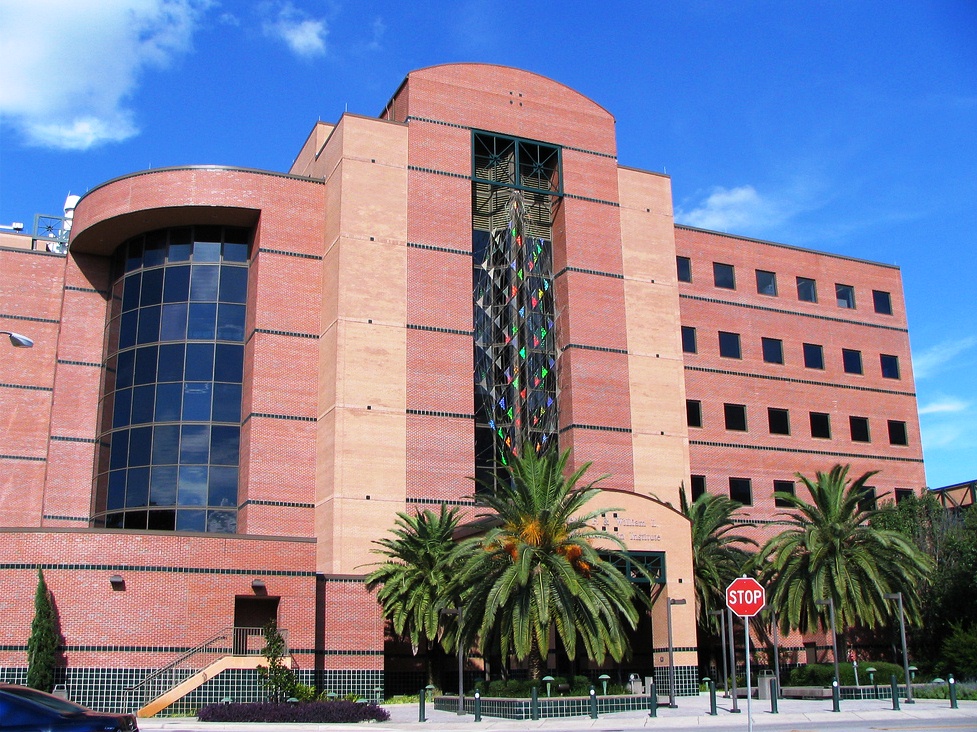 The strategic plan focuses on 1) memory in aging, 2) brain tumor, 3) neurodegeneration, 4) brain and spinal cord injury, and 5) drug addiction. Here are some highlights:
The strategic plan focuses on 1) memory in aging, 2) brain tumor, 3) neurodegeneration, 4) brain and spinal cord injury, and 5) drug addiction. Here are some highlights:
- Memory in Aging: The Age-Related Memory Loss Program (Dr. Thomas Foster, Director) at the MBI continues to collaborate with researchers of the Institute on Aging at UF and partner MBIs to advance clinical, epigenetic and magnetic resonance imaging projects to decipher the mystery of memory in general and cognitive alterations in aging.
- Brain Tumor: The UF Brain Tumor Immunotherapy Program of the Department of Neurosurgery located in the MBI is now fully operational under the direction of Dr. Duane Mitchell. Dr. David Tran has been recruited from Washington University as a part of the UF Health Clinical Preeminence Program.
- Neurodegeneration: The Center for Translational Research in Neurodegenerative Disease (Dr. Todd Golde, Director) and the UF Health Center for Movement Disorders and Neurorestoration (Dr. Michael Okun, Director) work together for development of innovative approaches to the prevention, treatment and diagnosis of neurodegenerative disorders. The MBI also collaborated with the Center for NeuroGenetics (Dr. Laura Ranum, Director) to advance research in neurogenetic disorders, especially those caused by microsatellite repeat expansion.
- Brain and Spinal Cord Injury: This state-supported program welcomes Dr. Gordon Mitchell from the University of Wisconsin, who was successfully recruited to UF as a UF Preeminence Investigator with a high expectation to bring the spinal cord injury program to international prominence.
- Drug Addiction: The Center for Addiction Research and Education in the Department of Psychiatry is undergoing a leadership change after Dr. Mark Gold retired in 2014.
In addition to these strategic research areas, the MBI significantly contributes to the rapidly expanding programs for muscular dystrophy/myology research by helping the recruitment of Drs. H. Lee Sweeney and Elizabeth Barton as UF Preeminence Investigators. The MBI also houses the UF Center of Smell and Taste, where Dr. Steve Munger has been recruited as a UF Preeminence Investigator.
Florida Brain Program: In response to President Obama’s Brain Initiative (Brain Research through Advancing Innovative Neurotechnologies, also referred to as the Brain Activity Map Project) the MBI hosted the Symposium on the Brain Initiative in January 2014; Dr. Emery Brown from the MIT was the keynote speaker. The MBI further expanded this symposium and established the Florida Brain Project, whose organization involves leaders from major academic institutions. The inaugural FBP Conference took place in Tallahassee in July 2014. The purpose of the FBP is to establish the collaborative body of basic and clinical neuroscientists from key academic institutions in the state of Florida to 1) provide solutions for threats of neurological disorders, especially those afflicting the increasing population of aging retirees, and 2) develop novel technologies to map brain activities and aid performance of healthy and damaged brain. The MBI has also reignited the collaboration with the Florida Institute of Human and Machine Cognition (IHMC, Pensacola, Florida). Recruitment of two new Preeminence faculty, Drs. Kevin Otto and Karim Oweiss, in the College of Engineering is a strong gain for the technological development at the UF.
Other News of the MBI: The Department of Neuroscience and the MBI hosted the annual Brain Awareness Week events from the 10th to 16th of March 2014. During the week, Dr. Steven T. DeKosky, of the University of Virginia, gave the William G. Luttge Lecture in Neuroscience as keynote speaker in the DeWeese Auditorium. The 3T MR equipment dedicated to human research at the Advanced Magnetic Resonance Imaging and Spectroscopy facility at the MBI is reaching full capacity. AMRIS is preparing for acquisition of a second 3T human research MR equipment.
The MBI is planning to purchase a multiphoton microscope, an essential cutting-edge technology that we must have to be competitive in the current NIH grant environment.
In 2014, the MBI offered a match for donations that support training in brain research. The condition is that these donations are deposited in MBI accounts with the signature authority belonging to the recipient of the specific donation. The MBI used $1.1 million for the match, resulting in $2.2 million in educational funds residing within the MBI. The MBI also matched a $500,000 donation for brain tumor research.
The MBI offered $2,000 in travel funds to students, residents, fellows and junior faculty who had a platform presentation or a press conference at a national or international professional conference. The MBI also gave a total of $120,000 to support selected postdoctoral fellows who investigate neurodegenerative disorders.
UF Health Shands Hospital (Shands Teaching Hospital and Clinics Inc.)
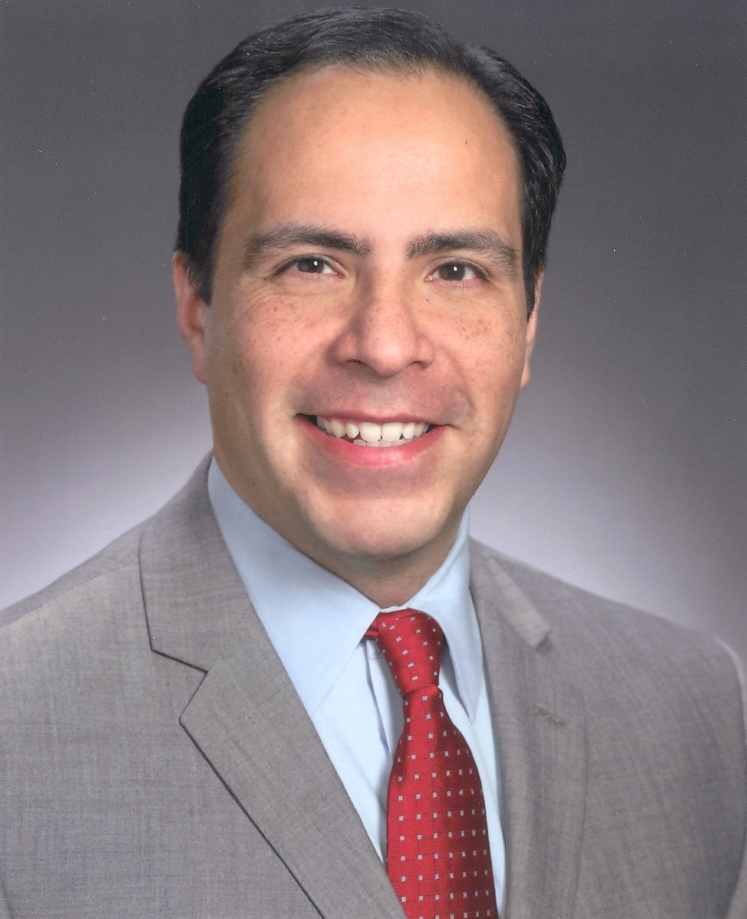 Interim CEO: Ed Jimenez, M.B.A.
Interim CEO: Ed Jimenez, M.B.A.
2014 can easily be characterized as a year of unstoppable momentum. At UF Health Shands, we celebrated multiple milestones and further expansion of our clinical services. These successes are a credit to the incredible teamwork and shared goals of faculty and staff across UF Health. Our results arose from careful preparation and planning over time: Rather than a culmination of our efforts, the year mirrors what’s still to come.
First, we thank Tim Goldfarb for his tremendous guidance and compassionate leadership. In July, after 14 years as CEO for UF Health Shands, Tim took a new role as UF Health executive vice president for regional and governmental affairs. Another UF Health legend is Bill Robinson, recently retired longtime senior vice president and chief financial officer, whose steady fiscal management was always grounded in an unwavering commitment to our patients. Other talented and trusted colleagues retired last year, and we also honor their contributions.
I am privileged to partner with fellow hospital leaders who directly lead the clinical enterprise. We thank Irene Alexaitis, M.S.N., R.N., NEA-BC, UF Health Shands Hospital vice president and chief nursing officer, and her skilled nursing and patient services teams; and Timothy C. Flynn, M.D., UF College of Medicine senior associate dean for clinical affairs and UF Health Shands chief medical officer, and our outstanding medical staff. And, of course, we recognize the leadership of UF College of Medicine Dean Michael L. Good, M.D., and his senior associate deans for their partnership. We are also grateful for the collaboration of the other Health Science Center college deans and their teams.
Our success was not without challenges. Expert doctors, nurses, clinical and support staff at UF Health Shands worked tirelessly to serve patients in Gainesville as we experienced increasingly high volume growth. Our teams managed 52,481 hospital admissions; 97,819 E.R. visits; 839,125 hospital-based outpatient visits; and 3,434 UF Health ShandsCair emergency transports. Meanwhile, UF Health Physicians faculty practices tracked 718,832 outpatient visits. Our teams met the operational demands of these record numbers with a sustained focus on delivering the highest-quality, safest care and warm, hospitable service that keeps patients returning to UF Health.
Their commitment and tireless efforts have not gone unnoticed, and we received many accolades. The external validation of our quality journey came in the fall, when UF Health Shands sustained our rating of four out of five stars for quality accountability and performance from the University HealthSystem Consortium. Our score was above the median for four-star recipients and showed significant improvement. We also received outstanding news that among the university hospitals in the U.S. we have ranked No. 9 in patient safety. We also excelled in U.S. News &World Report’s Best Hospital rankings: A total of 10 medical specialties — seven pediatric and three adult — earned Top 50 honors in the 2014-15 national rankings. These accomplishments are a direct result of the caregivers who look after our patients every day, thousands strong, providing great care.
UF Health is on the map in other new and exciting ways.
We began the year by launching the UF Health Cancer Center at Orlando Health. This strategic alliance between UF Health Shands, the UF College of Medicine and Orlando Health helps UF Health advance our patient care mission by providing residents of central Florida with improved access to UF Health physicians’ innovative oncology care and clinical trials, and supporting UF’s diverse research and education activities. UF Health also benefited from additional state funding this year that will help us as we pursue National Cancer Institute designation.
Locally, we continued to invest in programs and facilities to improve patients’ access to care in convenient locations and to enhance the environment in which our experts provide care. The UF Health Shands Children’s Hospital was transformed in several steps. We opened a new UF Health Congenital Heart Center Pediatric Cardiac ICU with 23 private patient rooms for specialized teams to provide high-quality and innovative care for our young patients. Then we unveiled the new children’s hospital exterior façade and opened a dedicated entrance and the Sebastian Ferrero Atrium, a beautiful and comforting gateway into our facilities for pediatric patients and their families. We also made other improvements to buildings and resources to meet patient and staff needs.
We continued to invest in trauma and emergency care resources. At UF Health Shands Hospital, we marked our 10th anniversary as a state-designated Level 1 trauma center and celebrated service to more than 22,000 patients. The team’s ability to mobilize quickly and provide care to patients with highly complex, traumatic injuries allows us to maintain our Level 1 certification and impeccable reputation. The UF Health ShandsCair critical-care transport program replaced an aircraft this past summer. The new helicopter is the largest, fastest and most advanced civilian aeromedical helicopter in the Southeast, and can transport two patients to our hospital from as far away as the Keys, Atlanta or Pensacola without stopping to refuel. Last year we also marked the first anniversary of the freestanding, 911-receiving UF Health Shands Emergency Center at Springhill and service to more than 16,000 patients.
In the fall, the UF Health Shands board of directors approved funding for construction of the UF Health Heart & Vascular Hospital and the UF Health Neuromedicine Hospital. We recently broke ground and will begin to see the site develop quickly this spring. These hospitals will pair a remarkable healing environment with the comforting care provided by our talented physicians, nurses and staff. Additionally, co-locating specialized hospital services on one campus will make access to that care more convenient and efficient.
As we embark on the new year, we will stay focused on achieving even higher quality and safety measures, carefully guiding expansion and building on the teamwork we’re cultivating to make our patient experience the best it can be. We are excited to continue rolling out UF Health Hospitality and Service training to our frontline faculty and staff at UF Health Shands, the UF College of Medicine and UF Health Physicians and to look closely at how we serve and treat each other as the basis for improving the care we provide patients and their families.
None of this, of course, would be possible without the many heroes among us — that’s you, our faculty, staff and volunteers. Your skilled and selfless work allows us to answer the call of our patients. Consider the day we recently mobilized to respond to three separate school bus crashes in a single afternoon, or the life-saving transplants we regularly perform, or the hugs we give and hands we hold. Your ability to quickly adapt and respond is at once routine yet no less remarkable. We are strong and successful because of the people we have here as part of our UF Health family.
Together we’ve accomplished so much. We have a lot to be proud of. And we’re excited about the growth to come, as we work diligently to care for our patients and help them achieve the best possible outcomes. Thank you!
UF Health Jacksonville
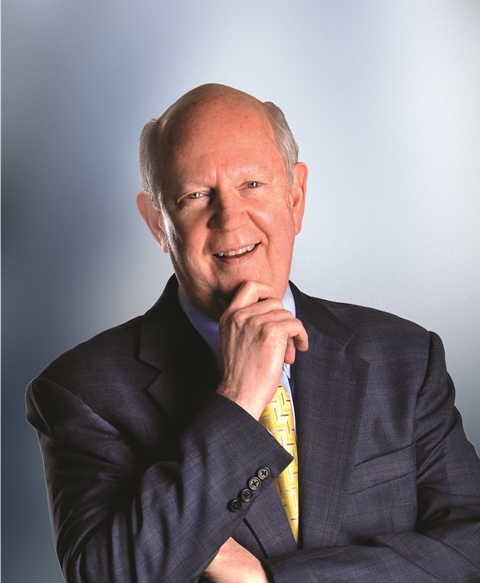 CEO: Russell E. Armistead, M.B.A.
CEO: Russell E. Armistead, M.B.A.
UF Rebranding and Community Awareness: The UF Health rebranding effort continued this year with amazing success. The Jacksonville community’s recognition of UF Health is visible in all media outlets. We will continue this with emphasis on “Jacksonville” to reinforce our presence. We successfully engaged the Jacksonville Civic Council, a group of 70 business leaders in Jacksonville, to establish a Task Force that reviewed our mission and operations. That review is still underway, but all indications are that they will fully support us both locally and in Tallahassee during this coming Legislative Session.
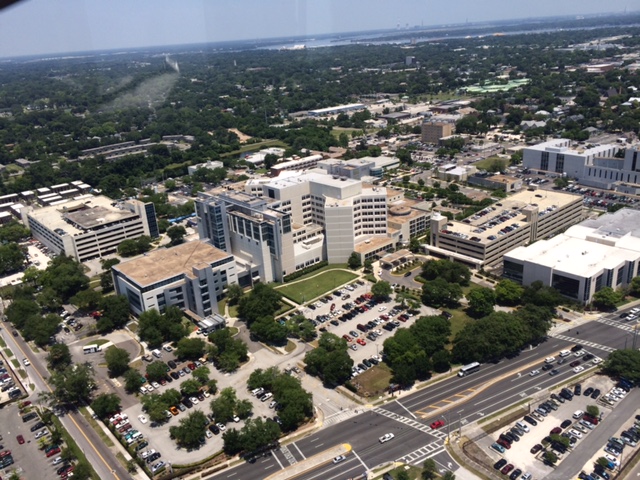 We were, and will continue to be, the
“TPC Charity of the Day” for the Saturday of THE PLAYERS Championship tournament. This high-profile event provides great visibility in our community. We distributed more than 30,000 UF Health-branded bottles of sunscreen at the entrances to the tournament. It was a fun day and event.
We were, and will continue to be, the
“TPC Charity of the Day” for the Saturday of THE PLAYERS Championship tournament. This high-profile event provides great visibility in our community. We distributed more than 30,000 UF Health-branded bottles of sunscreen at the entrances to the tournament. It was a fun day and event.
The Rita Golf Tournament and the Trauma Center’s “Night for Heroes” event were very successful, raising over $250,000 for our programs.
UF Health North:
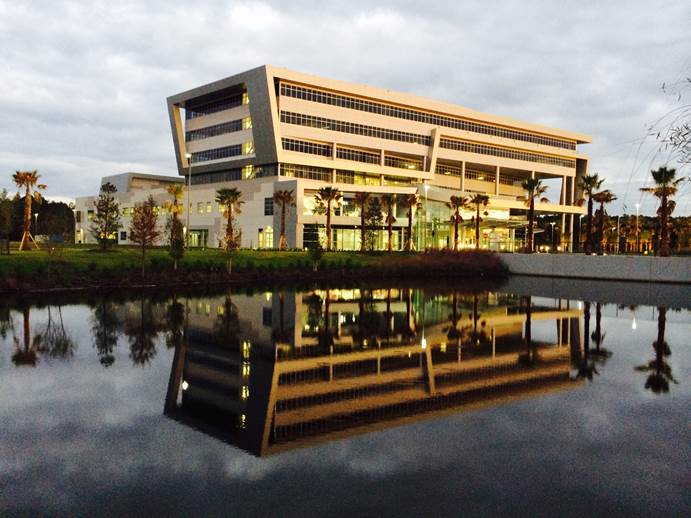 UF Health North is our future and we have hit all the critical milestones on time. This 210,000-square-foot state-of-the art medical office complex houses an emergency department, ambulatory surgery suites, CT, open MRI, interventional radiology, laboratory and cardiac catheterization suite. It will open in February 2015. In July 2014, our Certificate of Need challenge was overcome and we were awarded a CON to build a 92-bed hospital. We are currently in the planning phase for the bed tower, with a projected completion date of June 2017. This is our future and we are committed to making it successful!
UF Health North is our future and we have hit all the critical milestones on time. This 210,000-square-foot state-of-the art medical office complex houses an emergency department, ambulatory surgery suites, CT, open MRI, interventional radiology, laboratory and cardiac catheterization suite. It will open in February 2015. In July 2014, our Certificate of Need challenge was overcome and we were awarded a CON to build a 92-bed hospital. We are currently in the planning phase for the bed tower, with a projected completion date of June 2017. This is our future and we are committed to making it successful!
Clinical Quality & Patient Safety: We have extended Patient Safety Executive Walk-Rounds to continue to improve patient safety and staff engagement. We continue to train more than 400 residents and faculty in our Simulation Lab. We were recognized in the Florida Hospital Association 2014 Community Benefit Report for our Hands-Only CPR Initiative, which has trained more than 16,000 people in the Jacksonville community. Our thanks to Joseph Sabato, M.D., and our other UF Health faculty and staff for their personal dedication to this effort. We were ranked the 11th best out of 260 hospitals in this state by U.S. News & World Reports, and, as part of our overall effort towards continual improvement in quality and safety, we have appointed Kelly Gray-Eurom, M.D., as our full-time Chief Quality Officer.
Finances: We had a great year making our first profit since 2011 and beating our budget target. Although small, it was a profit and credit goes to all our faculty and staff, who worked incredibly hard to make that happen. We continued our expansion of the Epic Electronic Health Record, with successful implementations of the Ambulatory, Beacon, Optime, Radiant and My Chart modules. As a result, we were successful in meeting the Stage II EMR Meaningful Use requirements, which provided $1 million in additional funding. We successfully converted our entire general ledger and supply chain system to PeopleSoft. We also improved our Commercial/HMO/PPO payer mix by 8 percent, which is critical for our financial success. We successfully received an award from AHCA to be the Provider Service Network (First Coast Advantage) for our region’s Florida Medicaid Managed Care program. We began full-risk operations on May 1, 2014. This PSN showed a high initial value and we sold that business to Molina Healthcare on Dec. 1, 2014. This sale provided essential cash for our clinical operations.
In summary, there were lots of things happening at UF Health Jacksonville this past year, and we continue to be very busy clinically and operationally.
2015 is clearly upon us in full force, and things seem busier than ever. Among other things, since the 5-year Forward Together Strategic Plan will come to an end in May of 2015, we are now creating our second 5-year plan. This process involves the college deans, center and institute directors, hospital leadership and the faculty and staff in each of the colleges and hospitals. We have created significant momentum in all of our missions and are well on our way to achieving our vision of making this momentum unstoppable.
Forward Together,
David S. Guzick, M.D., Ph.D. Senior Vice President, Health Affairs President, UF Health
About the author
